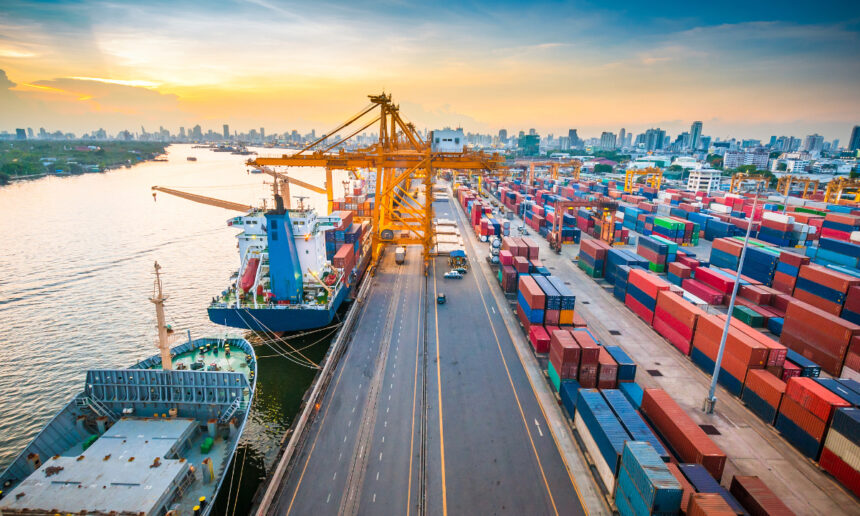By :Wang Cong and Ma Jingjing
China’s Foreign Ministry said on Monday that protectionism leads nowhere, in response to a question about US President Donald Trump’s announcement of 25 percent tariffs on all steel and aluminum imports.
In another escalation of US tariff war against trading partners, Trump said on Sunday that “any steel coming into the United States is going to have a 25 percent tariff … Aluminum, too,” according to The New York Times.
Asked to comment on the latest US protectionist tariffs at a regular press briefing on Monday, Guo Jiakun, a spokesperson for the ministry, referred specific questions to competent authorities.
“Let me stress that protectionism leads nowhere, and trade and tariff wars have no winners,” Guo said.
Trump’s 25-percent tariff will likely have greater impact on countries such as Canada, Brazil, Mexico and South Korea, which, according to The New York Times, are the biggest suppliers of steel to the US in 2024. China does not export a lot of steel or aluminum directly to the US, according to a separate New York Times report.
Trump’s latest remarks on tariffs have sparked global concerns, with various US trading partners vowing to respond to the potential tariffs.
“Canadian steel and aluminum support key industries in the US from defence, shipbuilding and auto,” Canadian Innovation Minister Francois-Philippe Champagne said in an online post, according to Reuters on Monday. “We will continue to stand up for Canada, our workers, and our industries.”
France’s foreign minister has pledged to react to Trump’s latest tariff announcements, saying Paris will call on the EU to respond, while South Korea’s industry ministry also said it would work closely with steelmakers to actively respond to the potential tariffs, the Guardian reported on Monday.
Trump’s tariffs also lifted the prices of gold and aluminum in global markets, amid growing concerns over the impact of Trump’s tariffs. “One of the impacts of these tariffs is depressed global economic activity,” Kyle Rodda, senior financial markets analyst at Capital.com, was quoted as saying in the Guardian’s report.
In addition to the 25-percent tariff on steel and aluminum imports, Trump on Sunday also threatened that he would soon announce so-called reciprocal tariffs on US trading partners, according to The New York Times.
For China, the impact will be limited, given the small amount of steel exports to the US, according to Wang Guoqing, research director at the Beijing Lange Steel Information Research Center.
“China exported 890,000 tons of steel directly to the US in 2024, representing 0.8 percent of China’s total exports. Therefore, additional US tariffs would have a limited impact on China’s steel exports,” Wang told the Global Times on Monday.
Moreover, China has introduced a series of measures to boost its domestic demand, including a large-scale trade-in program, while also diversifying export channels to new markets, Wang said.
“While the Trump administration offers various justifications for imposing tariffs on other countries, the real purpose of the White House is to pressure other countries into compliance by weaponizing tariffs,” He Weiwen, a senior fellow at the Center for China and Globalization, told the Global Times on Monday.
“It would pose a significant challenge to global free trade and multilateral trade rules if Trump were to further escalate his tariff policies,” He said, while noting that Trump’s tariffs will cause more harm to the US, as they will increase inflation, slow US economic growth and make American consumers paying the price.
Consistent stance
China’s opposition to unilateral and protectionist tariffs imposed by the US has been clear and consistent. On Monday, China’s additional tariffs on certain US products officially went into effect, according to a report from Yuyuantantian, a social media account affiliated with China Media Group.
China on February 4 announced a 15-percent tariff on coal and liquefied natural gas and 10 percent tariff on crude oil, agricultural machinery, large-displacement cars, and pickup trucks, in response to US’ imposition of a 10-percent tariff on all Chinese goods to the US under the guise of issues such as fentanyl.
“China’s stance is very clear: countermeasures against US tariffs were implemented as scheduled. If the US takes any further actions, China will continue to take resolute measures to safeguard its own interests,” the Yuyuantantian report said.
Notably, on the same day China’s tariffs against US products took effect, the China Council for the Promotion of International Trade (CCPIT) led more than 30 Chinese companies in fields such as mineral resources, energy, petrochemicals, and machinery manufacturing to Kazakhstan to sign cooperation deals, Yuyuantantian said in a separate post on its Weibo account.
According to the post, the CCPIT will also lead Chinese firms to the Middle East, Central Asia, Europe, Africa and other places to explore diver markets and discuss cooperation in areas such as oil and gas trade, automobiles, and agricultural machinery.
It’s worth pointing out that energy, automobiles and agricultural machinery were the areas covered by China’s tariffs countering the US’ protectionist duties.
Bai Ming, a research fellow at the Chinese Academy of International Trade and Economic Cooperation under the Chinese Ministry of Commerce, said US’ tariffs have not and will not stop China’s strong exports to other countries.
“The US tariffs harm others, while not even benefiting the US,” Bai told the Global Times on Monday, adding that the lose-lose nature of Trump’s tariff wars will be even more prominent this time around, as he constantly seeks to escalate the conflicts with more countries and involve more products.
Meanwhile, there is also great attention paid to China’s responses to the US’ protectionist moves. At the press briefing on Monday, a foreign media reporter asked Guo, the spokesperson for the Chinese Foreign Ministry, to comment on a Wall Street Journal report claiming that China is compiling a list of US tech firms to target with antitrust probes and other tools.
“I am not familiar with what you mentioned. China opposes overstretching the concept of national security and politicizing trade and tech issues,” Guo said, adding that China remains committed to fostering a market-oriented, law-based and world-class business environment. The Chinese market sees all countries as equals and is equally open to companies from all countries.













